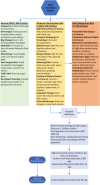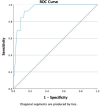Reducing dehydration-induced readmissions post-colorectal surgery: the impact of a prevention bundle
- PMID: 39243310
- PMCID: PMC11380635
- DOI: 10.1007/s00384-024-04709-5
Reducing dehydration-induced readmissions post-colorectal surgery: the impact of a prevention bundle
Abstract
Introduction: Ileostomy, frequently created after colorectal resections, hinders the physiologic function of the colon and can lead to dehydration and acute kidney injury due to high stoma outputs. This study aimed to evaluate the effectiveness of preventive measures on ileostomy-induced dehydration and related readmissions in a high-volume unit.
Methods: In this prospective cohort study at a high-volume colorectal surgery department in Turkiye, the Prospective Ileostomy-induced Dehydration Prevention Bundle Project (PIDBP) was assessed from March 2021 to March 2022. The study enrolled patients undergoing colorectal surgery with ileostomy and involved comprehensive inpatient stoma care, education, and a structured post-discharge follow-up. The follow-up included the "Hydration follow-up scale" to monitor ileostomy output and related complications. The primary outcome was the readmission rate due to dehydration-related complications. The patients receiving the bundle intervention were compared with patients treated in the preceding year, focusing on the effectiveness of interventions such as dietary adjustments, fluid therapy, and pharmacological management.
Results: In the study, 104 patients were analyzed, divided into 54 pre-bundle and 50 bundle group patients, with no significant differences in patient characteristics. While the overall readmission rate due to dehydration was 12.5%, a significant reduction in dehydration-related readmissions was observed in the bundle group compared to the pre-bundle group (2% vs. 22%, p = 0.002). Univariate analysis identified high stoma output (> 800 ml/24 h) (p < 0.001), chronic renal failure (CRF) (p = 0.01), postoperative ileus (p = 0.03), higher ASA status (p = 0.04), extended hospital stays (p = 0.03), and small bowel resections (especially in J-pouch patients) (p < 0.001) as significant predictors of readmission. Multivariate analysis revealed that the mean ileostomy output before discharge was the sole significant predictor of dehydration-related readmission (OR 1.01), with an optimal cutoff of 877.5 ml/day identified with an area under the curve (AUC) of 0.947, demonstrating high sensitivity (92.3%) and specificity (86.8%) in predicting readmission risk.
Conclusion: The Prospective Ileostomy-induced Dehydration Prevention Bundle Project significantly reduced readmission rates after colorectal surgery.
Keywords: Colorectal surgery; Dehydration; Ileostomy; Readmission.
© 2024. The Author(s).
Conflict of interest statement
The authors declare no competing interests.
Figures
References
MeSH terms
LinkOut - more resources
Full Text Sources
Medical




